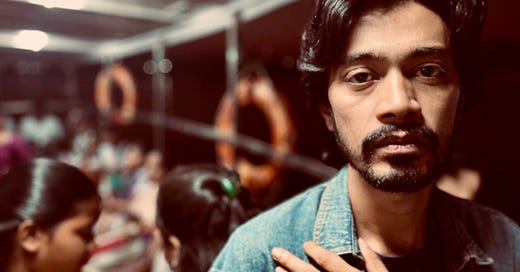The poet and performer Aamir Aziz was born in a village outside Patna in 1989. His father worked as a Unani medicine doctor and Aamir studied at first in the village school. Much later, he joined Jamia. His childhood was marked by deprivation; the government salary for his father was erratic. He remembers his mother saying “अब्बा का पैसा बंद है”. These words uttered by his mother, he says, were perhaps his first introduction to language. The environment at home could not be described as intellectual or artistic. His sister was the first girl in the family to attend college; several of his relatives could only find employment as daily-wage laborers. When he escaped from Patna and came to Delhi, this was when he was around seventeen, he joined a leftist theater group. He remembers watching and being moved by Anand Patwardhan’s documentary films. The diploma from Jamia allowed him to get a job as a junior engineer, and for a while he would have to travel to a construction site to supervise the building of a bridge. He was earning eight thousand rupees every month. Now, while doing that day job, he also started pursuing a higher engineering degree by attending evening classes. Four years passed. During this time, the work and also the study frustrated him. What he enjoyed more was writing plays and poetry; he had also learned how to play the guitar that he had borrowed from a friend. He discovered the work of Faiz Ahmad Faiz. He was learning to communicate in English. In this he was helped by a guest lecturer in English named Prashant Gupta who also exposed him to Bob Dylan: Aamir wrote a Bhojpuri version of a Dylan song (“Knocking on Heaven’s Door”).
He was already becoming who he is now.
I have loved Aamir Aziz ever since I heard him singing this wonderful anthem of resistance. Then came his moving ballad about the lynching of a Muslim man named Pehlu Khan. He was from my hometown, so I wrote to him. We exchanged notes. I told him about listening to Pete Seeger singing his protest songs at a particular crossroad in the town where I live in Hudson Valley; I might have mentioned that on the morning that my son was born I came home and saw that Pete Seeger was singing on our college campus and my daughter, only six years old then, had gone to listen to him. This past winter I spent some time with Aamir in Mumbai. I took the above photograph of Aamir while we were on the ferry to Versova.
During the protests against the proposed discriminatory changes to India’s citizenship laws, Aamir Aziz had recited his fiery nazm Sab Yaad Rakha Zayega. The line has been appropriated in a sly, unethical way by a visual artist named Anita Dube—I don’t know this artist’s work, it seems to be of the sort that prettifies protest, a kind of decorous practice dear to liberals. I suppose Dube will now be known only because of this act of exploiting a radical artist, but what is more significant is that perhaps this unseemly episode will return us to Aamir’s poetry.
But first this quotation from Aamir’s post accusing Dube of the theft of his work:
Let’s be clear: if someone holds my poem in a placard at a protest, a rally, a people’s uprising I stand with them. But this is not that.
This is my poem, written in velvet cloth, another carved in wood, hung inside a commercial white cube space, renamed, rebranded, and resold at an enormous price without ever telling me.
This is not solidarity.
This is not homage.
This is not conceptual borrowing.
This is theft.
This is erasure.
This is the entitled section of the art world doing what it does best extracting, consuming, profiting while pretending it’s radical.
This is outright cultural extraction and plunder stripping authors of autonomy while profiting off their voices, especially those from marginalised backgrounds. Their work is used without their knowledge, precisely so they can be excluded from the wealth produced through it.
In my case certainly, when I read the news, I was drawn back to Aamir’s poetry and I sat down to translate into English what he had written down for me some months ago.
Here is a fine video with Aamir made by Karwan e Mohabbat.






You are right. This episode has now increased my curiosity about Aamir and his poetry. Dube will now be known for stealing a work of art, and not for creating. Thank you for sharing.
It reminds me of many industries using skilled artists to create profits for few stars. The artists were often paid minimum wage, or nothing, or devalued… the work behind the screens (even silver screens, just like todays digital screens) were often not visible in a market clamoring for glamour, power, wealth… greed, …. . What were patents, copyrights, published works, certified skills(degree) in learning … in civilian lives… these were considered as means to bring dignity, value& acknowledgement of peoples work, effort, skills, contributions,… even identities. What were trophies, medals, admission ticket to an event… they were attempts to acknowledge participation, overcoming struggles, contributions in participating in humanity, inclusion. … but the market place of profiting from fellow humans work …. The ever fluctuating economic systems& wars, its a very unregulated, road… today digital time we can add populism by algorithm regulation, autoplay code, cyber malware… that often lead to old roads of loot, struggling people, wars, poverty, …. Without dignified civilian systems, accountability, it devolves to loot by power rapidly. History shows many such issues. How it is resolved is always important.